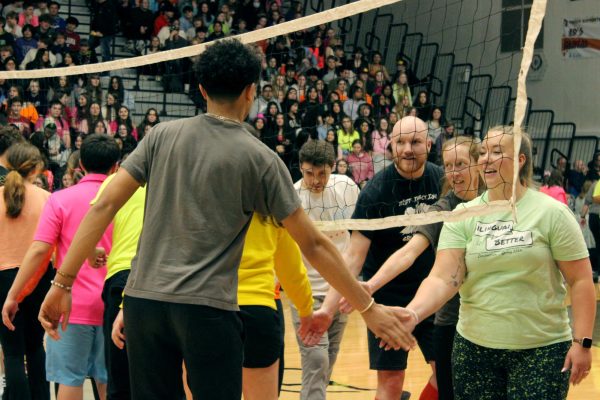Omicron devastates schools and businesses, including in McHenry County
COVID-19 cases are on the rise, causing some schools to go remote and businesses to struggle
Mike Stocker / South Florida Sun Sentinel / TNS
Residents receive COVID test kits at the City of Boca Raton Administration Complex on Jan. 7, 2022.
January 18, 2022
Despite vaccination efforts, as of Jan. 18, the United States has 66.5 million COVID-19 cases. Omicron, a COVID-19 variant, accounts for over 98% of those cases.
As of Jan 1, the CDC’s Nowcast Model reports that omicron accounts for 93.79% of all COVID-19 cases in Region 5 of the United States, which includes Illinois. McHenry County has 56,338 COVID-19 cases and a positivity rate of 24.05%, as of Jan. 16.
The Chicago area has been particularly devastated by Omicron and other COVID-19 variants. According to ABC Chicago News, the number of hospitalized children under five has gone up, since there is no vaccine for them. Immunocompromised children were the most likely to contract COVID-19 and be in the Intensive Care Unit (ICU). Because of this, many schools in Chicago have gone remote. The ones that remain open struggle with staff shortages due to high positivity rates, according to Vox.
Although MCHS remains open and in-person, quarantine and isolation guidelines have changed. On Jan. 7, MCHS reduced the quarantine period for students and staff who contract COVID-19 to five days. The decision followed guidance from the Illinois Department of Public Health and the McHenry County Department of Health.
“We will begin implementing the new shorter quarantine guidance effective immediately,” wrote Ryan McTague, Superintendent of District 156, in an email. “Please note: the new guidance does not change the state of Illinois’ mask requirement for anyone inside school buildings.”
Aside from schools, many businesses are struggling to remain open during the omicron surge. Many employers are experiencing staff shortages after the Occupational Safety and Health Administration announced a vaccine mandate. OSHA’s vaccine mandate would require employers with more than 100 employees to either vaccinate all employees or test them weekly for COVID-19.
“OSHA has determined that many employees in the U.S. who are not fully vaccinated against COVID-19 face grave danger from exposure to COVID-19 in the workplace,” reads OSHA’s summary of the policy. “Workers are becoming seriously ill and dying as a result of occupational exposures to COVID-19, when a simple measure, vaccination, can largely prevent those deaths and illnesses.”
OSHA’s mandate received backlash from many employees, particularly healthcare workers. 10 states sued the Biden Administration and the Centers for Medicare and Medicaid Services (CMS) over the mandate.
“The CMS vaccine mandate threatens with job loss of millions of healthcare workers who risked their lives in the early days of the COVID-19 pandemic to care for strangers and friends in their communities,” states the lawsuit. “The Plaintiff States seek to end this dragooning of our States’ healthcare heroes.”
The case was handled by the Supreme Court where on Jan. 13, the mandate for large businesses was blocked. However, a vaccine mandate for government-funded healthcare facilities remains in place. President Biden expressed disappointment over the blocking of the large business mandate.
“I am disappointed that the Supreme Court has chosen to block common-sense life-saving requirements for employees at large businesses that were grounded squarely in both science and the law,” said Biden in a statement. “It is now up to States and individual employers to determine whether to make their workplaces as safe as possible for employees.”
Amid the omicron surge, the FDA amended the emergency use of Pfizer BioNTech’s COVID-19 vaccine. Anyone over the age of 12 is now eligible to receive a booster shot. The time between primary vaccination and booster dose has also been reduced to five months. Additionally, immunocompromised children ages 5 to 11 are eligible for a third primary series dose of the Pfizer vaccine.
“With the current wave of the Omicron variant,” said FDA commissioner Dr. Janet Woodcock in a FDA update, “it’s critical we continue to take effective, life-saving preventive measures such as primary vaccination and boosters, mask wearing and social distancing in order to effectively fight COVID-19.”
The omicron variant was found in samples from South Africa and Botswana in Nov. 2021. It was reported to the World Health Organization who classified it as a variant of concern due to its concerning properties.






















